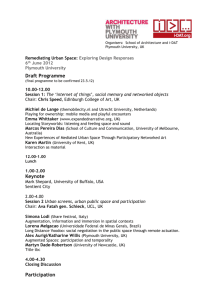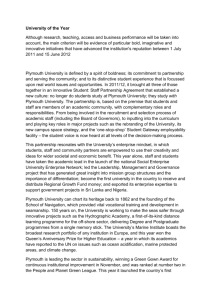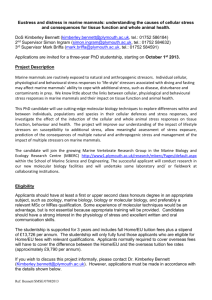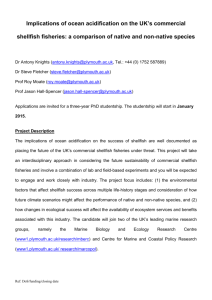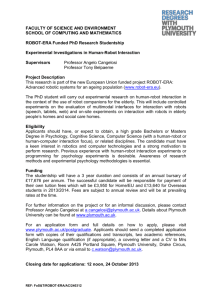NERC Funded Ph
advertisement
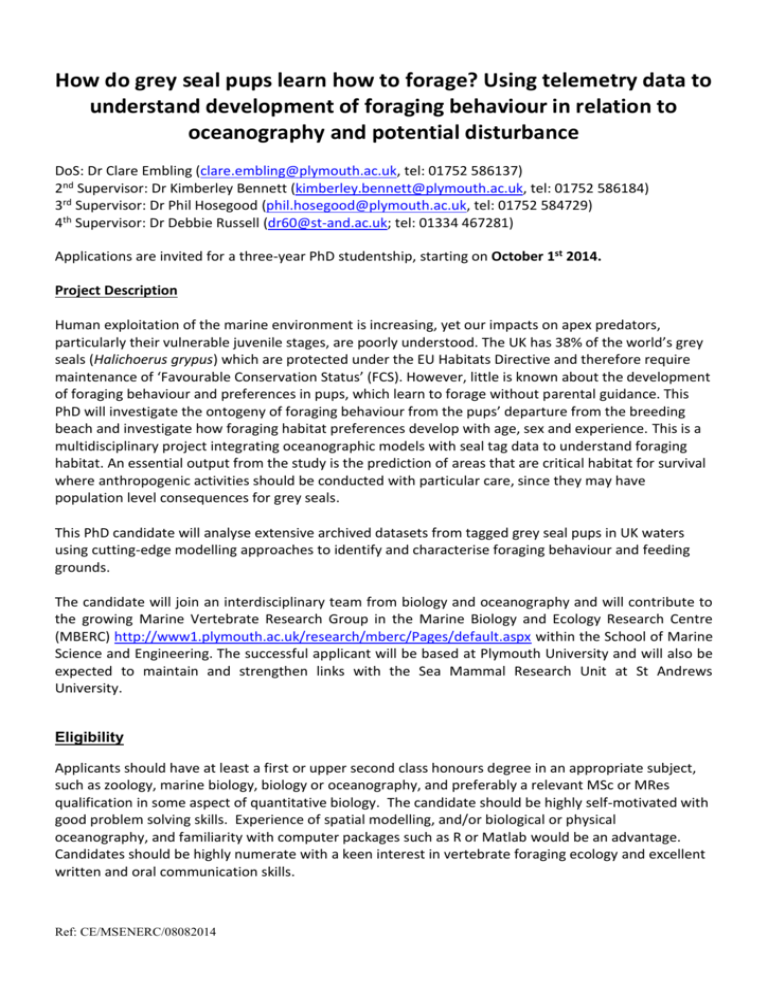
How do grey seal pups learn how to forage? Using telemetry data to understand development of foraging behaviour in relation to oceanography and potential disturbance DoS: Dr Clare Embling (clare.embling@plymouth.ac.uk, tel: 01752 586137) 2nd Supervisor: Dr Kimberley Bennett (kimberley.bennett@plymouth.ac.uk, tel: 01752 586184) 3rd Supervisor: Dr Phil Hosegood (phil.hosegood@plymouth.ac.uk, tel: 01752 584729) 4th Supervisor: Dr Debbie Russell (dr60@st-and.ac.uk; tel: 01334 467281) Applications are invited for a three-year PhD studentship, starting on October 1st 2014. Project Description Human exploitation of the marine environment is increasing, yet our impacts on apex predators, particularly their vulnerable juvenile stages, are poorly understood. The UK has 38% of the world’s grey seals (Halichoerus grypus) which are protected under the EU Habitats Directive and therefore require maintenance of ‘Favourable Conservation Status’ (FCS). However, little is known about the development of foraging behaviour and preferences in pups, which learn to forage without parental guidance. This PhD will investigate the ontogeny of foraging behaviour from the pups’ departure from the breeding beach and investigate how foraging habitat preferences develop with age, sex and experience. This is a multidisciplinary project integrating oceanographic models with seal tag data to understand foraging habitat. An essential output from the study is the prediction of areas that are critical habitat for survival where anthropogenic activities should be conducted with particular care, since they may have population level consequences for grey seals. This PhD candidate will analyse extensive archived datasets from tagged grey seal pups in UK waters using cutting-edge modelling approaches to identify and characterise foraging behaviour and feeding grounds. The candidate will join an interdisciplinary team from biology and oceanography and will contribute to the growing Marine Vertebrate Research Group in the Marine Biology and Ecology Research Centre (MBERC) http://www1.plymouth.ac.uk/research/mberc/Pages/default.aspx within the School of Marine Science and Engineering. The successful applicant will be based at Plymouth University and will also be expected to maintain and strengthen links with the Sea Mammal Research Unit at St Andrews University. Eligibility Applicants should have at least a first or upper second class honours degree in an appropriate subject, such as zoology, marine biology, biology or oceanography, and preferably a relevant MSc or MRes qualification in some aspect of quantitative biology. The candidate should be highly self-motivated with good problem solving skills. Experience of spatial modelling, and/or biological or physical oceanography, and familiarity with computer packages such as R or Matlab would be an advantage. Candidates should be highly numerate with a keen interest in vertebrate foraging ecology and excellent written and oral communication skills. Ref: CE/MSENERC/08082014 The studentship is supported for 3.5 years and includes full Home/EU tuition fees plus a stipend of £13,863 per annum. The position is open to UK citizens and EU citizens with appropriate qualifications who have been resident or studied in the UK for three years. If you wish to discuss this project informally, please contact Dr. Clare Embling (clare.embling@plymouth.ac.uk). However, applications must be made in accordance with the details shown below. For an application form and full details on how to apply, please visit www.plymouth.ac.uk/postgraduate. Applicants should send a completed application form along with a covering letter detailing their suitability for the studentship, C.V., and 2 references to Francesca Niedzielski, Graduate School, 305 Link Building, Plymouth University, Drakes Circus, Plymouth PL4 8AA or e-mail scienvresearch@plymouth.ac.uk The closing date for applications is 12 noon on 8th August 2014. Shortlisted candidates will be invited for interview in the last week of August 2014. We regret that we may not be able to respond to all applications. Applicants who have not received an offer of a place by mid-September should consider their application has been unsuccessful on this occasion. Ref: CE/MSENERC/08082014
